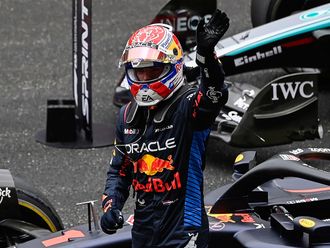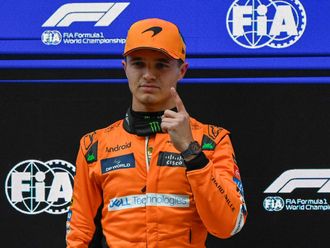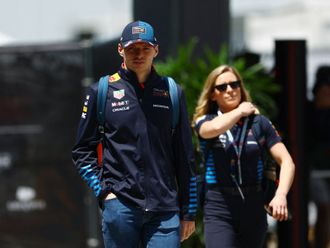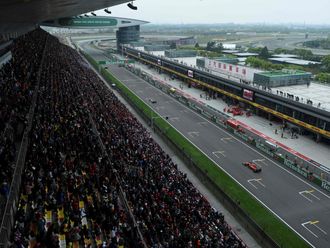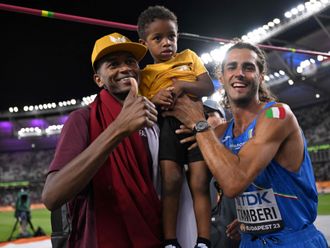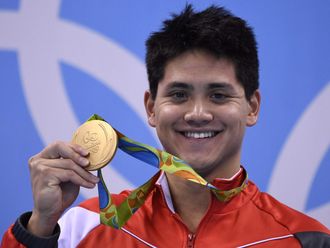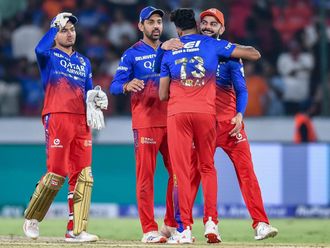Abu Dhabi: It’s been 20 years since his great rival, Ayrton Senna, perished after a crash at the San Marino Grand Prix — but memories of the Brazilian continue to stalk Alain Prost as relentlessly as his former foe used to pursue him on the track.
“How often do I think of him? Very often,” the four-time Formula One world champion told Gulf News in an exclusive telephone interview. “I am in my office at the moment and I look on the left and I have a picture of Ayrton and myself, and on the right I have his helmet. [Laughs] So I cannot be without him, because he’s part of my history in Formula One.”
Even in his new role as co-owner of the E.Dams Renault team in the recently launched Formula E series for electric cars, the Frenchman cannot escape the ubiquitous Senna, as the late Brazilian’s nephew, Bruno, is a competitor alongside Prost’s son, Nico.
Then there is Prost-Senna thrillingly revived in the form of Lewis Hamilton and Nico Rosberg’s fierce tussle for supremacy in the 2014 Formula One world title race.
The Frenchman’s ferocious face-off with Senna still resonates thunderously in the hearts and minds of sports fans due to the pair’s savage mutual enmity, which was characterised by two championship-deciding collisions.
These were two contrasting characters: Prost, the cool and calculating Frenchman, known as ‘The Professor’ for his cerebral driving approach, and two-time world champion Senna, the moody and mercurial genius with the swarthy good looks.
Both supremely gifted drivers and among the best of all time, they engaged in wheel-to-wheel combat and psychological warfare of the most furious and fascinating order from the mid-1980s to the early 90s.
Although their spats were numerous after Senna joined Prost at McLaren in 1988, the acrid hostility between the pair can be distilled in two key incidents, which proved crucial in deciding the F1 title in either driver’s favour in 1989 and 1990.
At the Japanese Grand Prix in 1989, Prost’s block of an attempted pass by Senna sent the pair spinning off the track — but, incredibly, the Brazilian resumed the race and went on to win. However, Senna was later disqualified and handed a six-month suspension and $100,000 fine (Dh367,000), leading him to accuse FIA president Jean-Marie Balestre of favouring his compatriot Prost.
The following year, by which time Prost had left McLaren for Ferrari due to the pair’s shared hatred, Senna wreaked spectacular revenge on his nemesis by deliberately driving into him — again at the Japanese Grand Prix.
The Brazilian went on to win both the race and the championship after Prost’s retirement, with the Frenchman later fuming: “What he did was disgusting. He is a man without value.”
Fast forward to 2014 and Prost, 59, is in more mellow and reflective mood.
“Do I regret [such collisions]? I never regret anything,” he said. “I really pushed very much to have Ayrton in my McLaren team. We had a fantastic battle which, physically speaking, was a little bit tense sometimes. But, at the end of the day, we made a story; a story that almost every day or every week people talk about.”
Prost went on: “It was a drivers’ battle, it was a human battle. We were different, charismatic people, with a different education and from different generations almost. I can’t be unhappy about that, because if you talk about my history in Formula One, you talk about Senna. When you speak about Senna, you talk about Prost. It’s really fantastic.”
It’s little surprise, then, that Prost welcomes Mercedes drivers Hamilton and Rosberg’s similarly incendiary duel — the Briton currently leading the German by 17 points in a pulsating season, during which they have clashed on and off the track.
“I think it’s really good for the sport,” Prost said.
Last month, Rosberg publicly admitted ‘an error of judgement’ after a collision with Hamilton, which forced his rival off the track and helped him win the Belgian Grand Prix.
Hamilton has since said he could foresee himself driving into someone deliberately if pushed hard enough, a la his hero Senna.
What did Prost think about the 2008 world champion making such a controversial statement?
The Frenchman said: “I wouldn’t make any comment on that. You can have a sort of comparison when you have two teammates with the best car fighting for the championship. But if you start to compare personalities from memories, no way, no way. Then we see he’s not Ayrton and I’m not Nico. It’s different.”
He added: “It depends which way it ends up, if you have a big rivalry which finishes quite well on the sporting side. I had two different sides of it with Ayrton in 1988 and ‘89.
“In 1988, he won the championship after winning one more race, although I got more points, but because of the regulations he was world champion. But we had a good, good season and good, sporting spirit.
“1989 was really a disaster. I don’t know if it was good for the fans, but at least they were able to see something dramatic. They could see that character. I don’t know if we can see that today because Formula One is different and more quiet in a way, with less charismatic personalities.”
Prost hopes Mercedes do not implement team orders to favour whoever takes a decisive lead in the championship race.
He said: “What is good for sport is people fighting until the end, not being number one or number two. And you let them fight and have a problem sometimes. I like the way it is and I don’t know what’s going to happen. Every race you can have a different situation. I hope the team do not make any team orders before the end of the season, as that would be a shame.”
Prost would not be drawn on who he thinks will clinch the title, but said the outcome could depend more on ‘the psychological side than on the performance side’.
It was in the mental department that the calmer Prost arguably had the edge on the more volatile Senna, whose instinctive brilliance often veered into recklessness.
These were two antagonistic forces colliding, then uniting, to remain forever inextricably linked — a remarkable case study of the vagaries of the human condition.
How could such bitter enemies end up becoming firm friends after Prost retired from F1 in 1993, to the extent that the Frenchman was a pallbearer at Senna’s funeral?
Prost said their tensions eased when he retired, adding that they had enjoyed many deep discussions about the past and issues in their sport, such as safety concerns.
Did they discuss the 1989 and 1990 episodes and offer apologies and explanations?
“Oh yeah, for sure,” Prost replied. “We talked about everything. But it was more of a laugh than reproach. Did he admit he drove into me deliberately in 1990? Yeah, yeah, for sure. He did that publicly and the year after. It was part of his personality.”
Such heart-to-hearts also revealed just how ardent and all-consuming Senna’s desire to outperform him had been.
“When I stopped racing in Adelaide [at the Australian Grand Prix] in 1993, the relations with Ayrton were completely different,” said Prost. “I understood very clearly that his main motivation, before he arrived in Formula One, was really myself.
“When I stopped and we were on the last podium, it was really unbelievable [to hear him] saying he would be bored without me and not find the same motivation. Then slowly, with different discussions, I understood why he was so aggressive and like this.
“It was his challenge, the way he was thinking and almost living. You can forgive different things when you learn things.”
But was his raging will to win ultimately destructive?
“He had his different thinking and different way of looking at things,” said Prost. “I still think of him as different and very special.”
Memories of the brooding Brazilian are myriad and readily spring to mind for Prost — but their last encounter is his most abiding one, a fitting end to a tumultuous journey from feuding teammates to brothers in arms.
“I went to see him in the garage just before the [San Marino] race,” he recalled. “He was doing some stretching and he’d said to me: ‘Please come and see me in the garage’. He was alone and we had that last discussion.
“And that is really a moment I will never forget.”
Later that fateful day on May 1, 1994, Senna’s Williams spun out of control and hit the track wall during the San Marino Grand Prix.
Despite strenuous efforts to save his life, one of the most revered drivers of his generation due to his innate driving skills, charm and honesty, succumbed to severe brain injuries, leaving sports fans worldwide paralysed with shock and anguish.
Few ached as much as Prost, though, who said: “Don’t forget that I was also doing the commentary for French TV at the same time. It was really, really a very difficult moment.”


